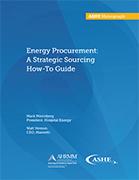Energy Procurement: A Strategic Sourcing How-To Guide

In the past, with energy costs largely regulated and therefore fixed, hospital engineers simply purchased energy directly from local utilities. Today, market deregulation coupled with a host of new financial intermediaries and energy products, advances in energy technology, and a new emphasis on sustainability requires energy buyers to make complex procurement decisions. These fundamental changes require that hospitals adopt new methods for sourcing energy supply (at least in deregulated markets). The most important of these methods is to align facility, finance, and supply chain professionals around a financial approach to energy procurement. This monograph sets forth energy procurement best practices adopted by leading health systems around the United States. The monographs suggests that in light of changes to both the energy market and the health care field, hospitals today should approach energy procurement using three best practice principles: aggregation, alignment, and analytics.
| Access PDF | Members can download a PDF of the entire monograph |
| Order print version | Catalog number: 055591 Member: $25.00, Nonmember: $35.00
|

